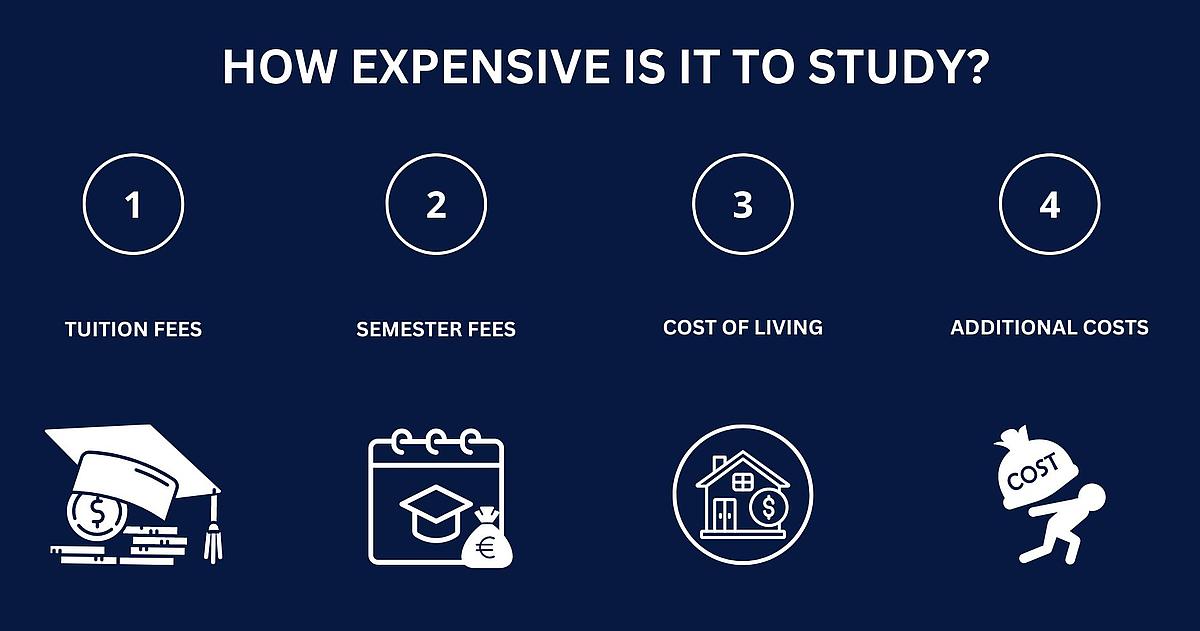This Website uses cookies to improve your visit on our website. More Info
Study Funding: All the Ways to a carefree time at University
Study funding is a central topic for many prospective students who face the challenge of financing their studies. Whether it's rent, tuition or living expenses, the path to a degree can be fraught with financial hurdles. In this article, we provide an overview of the various ways to finance your studies, from government assistance to scholarships and student loans.
How expensive is it to study in Germany?
The costs for studying can vary greatly and depend on several factors, such as the country, the university, the field of study and the personal living costs. Here are some typical costs that students should consider:
- Tuition fees:
- In Germany, tuition fees are generally low or non-existent at state universities, except in some federal states such as Baden-Württemberg, where international students have to pay up to €1,500 per semester. In Munich, international students at the TU Munich also have to pay a semester fee of €2,000. Private universities charge different tuition fees.
- In other countries, such as the United States or the United Kingdom, tuition fees are often very high and range from 10,000 to 50,000 euros per year, depending on the university and course of study.
- Semester fees:
- Public universities also often charge a semester fee, which can range from 100 to 400 euros per semester. This fee covers administrative costs and often also a semester ticket for public transport.
- Cost of living:
- The cost of living depends heavily on where you live. In big cities like Munich or Berlin, students can expect to pay between €500 and €800 per month in rent. In smaller towns, rent can be cheaper.
- On top of this, you will need to budget for food, leisure activities, learning materials, insurance and other personal needs. Overall, monthly living costs can range from around €700 to €1,200.
- Additional costs:
- In addition to the fixed costs, students also need to plan for additional expenses such as textbooks, study trips or special materials for their course of study.
Overall, studying in Germany can cost between €800 and €1,500 per month, depending on individual circumstances. In other countries, especially those with high tuition fees, the costs can be significantly higher.
Overview: How expensive is it to study?
Here is a brief overview in a graphic, as a summary of the four main factors that contribute to the cost of a degree program.

DID YOU KNOW?
If you want to find out how much a Bachelor's, Master's or MBA degree program at Munich Business School costs, just take a look at the relevant pages. The costs are broken down transparently there.
On the Scholarships & Study Funding page, you will also find helpful information on how to finance your studies at MBS.
Tips & tricks for
study funding

Tips & tricks for study funding
| Get informed early on | Research all financing options in good time so as not to miss any deadlines. |
|---|---|
| Combine options | Use different sources of financing such as BAföG, scholarships, part-time jobs and state aid. |
| Research scholarships | Look specifically for scholarships that not only focus on academic performance but also take into account social commitment or special backgrounds. |
| Create a budget | It helps to keep track of your monthly expenses and avoid unnecessary costs. |
| Choose part-time jobs wisely | Make sure that you have enough time for your studies and that you do not exceed 20 hours of work per week during the semester. |
| Check the repayment conditions | If you take out loans or educational funds, find out exactly how you will have to repay them to avoid financial burdens later on. |
| Reduce your living costs | Consider whether you can reduce your costs by sharing a flat, shopping around for cheaper options or other cost-saving measures. |
| Involve parents | Clarify at an early stage how your parents can support you in order to create a realistic financial plan. |
| Check possible state aid | Find out about additional state support such as housing benefit or citizen's income, if you are eligible for it. |
| Plan for the long term | Keep an eye on possible repayment obligations even after your studies so that you can start your professional future financially secure. |
Study Funding Options
There are various ways to finance your studies, such as state support through BAföG, scholarships from public or private institutions, student loans, and working while you study. Other options include financial support from your family or a dual study program in which you receive a salary while working in a practical setting alongside the theory. The right choice depends on your personal and financial circumstances.
If you are looking for more information on the topic of study funding, please feel free to visit our pages on study scholarships, student loans and working while studying.
To the Overview Page of the Topics covered in the Guides
Parental Support
Parental support is a common study funding option in which parents cover part of the costs of rent, living expenses and tuition fees. Some students choose to continue living with their parents because it is easiest and most cost-effective for them. In many cases, students are also entitled to child benefit, which is paid up to the age of 25 and can provide additional financial relief. However, this form of support depends on the financial situation of the parents and can vary from person to person. It usually offers more flexibility, as no repayment is required as with loans.
Advantages & Disadvantages of Parental Support
Here is a helpful table of the advantages and disadvantages of parental support for study funding:
| Advantages | Disadvantages |
|---|---|
| No repayment required | Parents must have sufficient financial resources |
| Flexible support tailored to individual needs | Dependence on parents' financial decisions |
| No dependence on external lenders or government agencies | Can cause tension in the family if expectations or boundaries are unclear |

Earnings (Part-time job, Mini-job or Dual Studies)
Earning money through a part-time job, mini-job or dual studies offers you the opportunity to help finance your studies yourself. With a part-time or mini-job, you can work flexibly to cover monthly expenses such as rent or food. However, working hours may not usually exceed 20 hours per week during the semester in order to retain student status. A dual study program combines theory and practice, where you also receive a salary, which provides regular financial support. However, these options require good time management to balance your studies and work.
Advantages & Disadvantages of earning money
Here is a helpful table of the advantages and disadvantages of earning money while studying to fund your studies:
| Advantages | Disadvantages |
|---|---|
| Your own income to cover living expenses | Increased stress due to the combination of work and study |
| Independence from loans or support from parents or the state | Less time for study and leisure |
| Professional experience and networking, especially in dual studies | Working time restrictions during the semester (max. 20 hours/week) |
More Information on the topic of working alongside your studies
To the article about Working alongside your Studies
BAföG
BAföG (Federal Training Assistance Act) is a german state support for students who do not have sufficient financial resources to finance their studies. Half of it is granted as a subsidy that does not have to be repaid, and the other half as After your studies, you will have to repay the loan portion in installments, although the amount is capped to keep the financial burden low.
Advantages & Disadvantages of BAföG
Here is a short table of the advantages and disadvantages of BAföG student loan program for study funding:
| Advantages | Disadvantages |
|---|---|
| Half of BAföG is a grant and does not have to be repaid | Dependent on parents' income, which can affect eligibility |
| Interest-free loan for repayment | Limited funding period, which is determined according to the progress of studies |
| Flexible repayment conditions after graduation | Application process can be bureaucratic and time-consuming |
| Additional funding options such as rent and insurance subsidies | Maximum repayment amount is capped, but it is still an obligation |
| No interest during the study period | Income limits that can reduce the amount |

Scholarship
A scholarship is an excellent way to finance your studies without having to pay it back later. Scholarships are awarded by various institutions such as foundations, companies or universities and are often based on performance, social commitment or special criteria such as the field of study. There are also funding programs that provide financial support based on special personal or family backgrounds. The advantage of a scholarship is that it offers you financial security without having to work alongside your studies, which gives you more time for your academic and personal goals. The disadvantage can be that you have to comply with certain requirements during your studies.
Advantages & Disadvantages of Scholarships
Here is a brief table of the advantages and disadvantages of scholarships for study funding:
| Advantages | Disadvantages |
|---|---|
| No repayment required | Strong competition and often demanding application process |
| Financial relief without having to work part-time | Usually tied to certain conditions such as performance or commitment |
| Focus on studies possible, as no additional income is required | Often limited in time, so that new financing must be sought |
| Recognition and networking opportunities through scholarship providers | Many scholarships do not cover all costs |
More information about study scholarships
To the article on Study Scholarships
Education Fund
An education fund is an alternative option for Study Funding, in which you receive financial support during your studies and only repay it after you have entered professional life. In contrast to traditional loans, repayment is income-dependent, which means that you only repay a fixed percentage of your future income over a certain period of time. This means that you do not take any risk if you earn less than expected after your studies. Education funds offer a flexible and low-risk financing option, although the total amount repaid is often higher than the original amount received.
Advantages & Disadvantages of Education Funds
This is a helpful table of the advantages and disadvantages of education funds for study funding:
| Advantages | Disadvantages |
|---|---|
| Income-dependent repayment, which minimizes the financial burden after graduation | Overall, repayments are often higher than with traditional loans. |
| No fixed monthly repayments during your studies | Limited availability, as only certain courses of study are funded. |
| Financial support without risk if your income is low after graduation | Repayment over a fixed percentage of your income for several years. |
| Flexibility in how the funds are used | Long-term commitment to the repayment agreement. |

Loans and Credits
A loan or credit is one way to finance your studies if other means are not sufficient. This means that you receive money from a bank or funding institution that you have to repay later, usually after you have completed your studies. Student loans often offer flexible repayment terms and low-interest conditions to reduce the financial burden. They can help to cover high tuition fees or living costs, but there is a risk of being in debt after your studies. It is therefore important to check the conditions carefully and to realistically assess your borrowing needs.
Advantages & Disadvantages of Loans and Credits
Here is a table of the advantages and disadvantages of credits and loans for study funding:
| Advantages | Disadvantages |
|---|---|
| Immediate access to funds | Repayment obligation after studies, often over many years |
| Enables financial independence during studies | Interest can increase the total debt |
| Flexibility in covering tuition and living expenses | Risk of getting into debt after studies |
| Often flexible repayment terms, e.g. for student loans | Burden of monthly repayments after graduation |
More Information about Student Loans
To the article about Student Loans
State Aid such as housing benefit, citizen's income, etc.
State aid such as housing benefit or citizen's income can help students to reduce the financial burden during their studies. Housing benefit supports you with rental costs if your income, including BAföG or other grants, is insufficient. Citizen's income (formerly known as Hartz IV) can be applied for under certain These benefits are means-tested and are intended to cover your basic needs so that you can concentrate on your studies without being overly burdened by financial worries.
Advantages & Disadvantages of Government Aid
Here is a concise table summarizing the advantages and disadvantages of government aid for study funding:
| Advantages | Disadvantages |
|---|---|
| Financial support to cover basic needs | Strict conditions that not all students meet |
| No repayment required | Bureaucratic effort required for application and proof |
| Can be obtained in addition to other forms of financing (e.g. BAföG) | Support often limited and insufficient for full study funding |
| Relief for rent and living costs | Dependence on state support |
Related Study Guides:
Study Scholarships
Student Loans
Working while studying
Start of studies
What should I study?
FAQ
There is no single scholarship that always pays the most, as the amount of the scholarships varies greatly. Scholarships from organizations for the promotion of young talent or private foundations are often particularly generous, offering not only monthly payments but also additional benefits such as travel expenses or funding programs. However, it depends on your course of study and your individual qualifications which scholarship is best for you.
Getting a scholarship can be difficult because the requirements are often high and the competition is fierce. In addition to good grades, social engagement, special skills or certain life circumstances are often required. However, there are many different scholarships with different requirements, so it depends on your individual situation.
Taking out a student loan can be a good idea if you have no other way to finance your studies and it allows you to focus on your studies. However, you should consider the repayment terms carefully so that you are not overly burdened after graduation.
The amount of the student loan depends on the provider, but in Germany you can usually receive between 100 and 650 euros per month. Overall, the maximum loan amount varies, often being around 30,000 euros, depending on the duration of your studies and your individual needs.
Interest rates on student loans vary depending on the provider and market conditions. In Germany, they usually range from 3% to 5% annually, with some loans having variable interest rates. It is important to check the terms carefully, as interest rates may change during the repayment period.
Interested in a study program? Request our information material now!
More exciting degree programs in Munich













